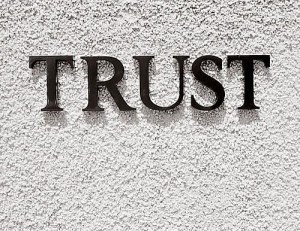Who do you trust?
Reversing the pervasive loss of trust in American life
Who do you trust? In the public square, that’s a more troubling question than it should be. There isn’t enough trust to go around and nearly every institution—government, media, business, sport, and even churches and charities–are responsible and suffering the impact.
All of these institutions have one thing in common. They are all human institutions. Government doesn’t violate laws, the people who should act as our public servants do. Television stations don’t twist the truth, reporters and commentators do. Corporations don’t cheat their shareholders, senior executives find a way to direct inordinate profits to themselves. The game of baseball or the sport of cycle racing don’t violate our trust. It’s the athletes themselves who cheat by introducing performance enhancing drugs into their systems. Contributors’ trust is violated by people who lead churches and charities, not by the institutions.
 While we can perpetually seek to fix institutions and serve the public good by creating more laws and regulations in order to regain public trust, institutions must look first at the core values of its leaders and all those to whom it grants responsibility. Trustworthiness of our leaders is built on both professional competence and ethical fidelity.
While we can perpetually seek to fix institutions and serve the public good by creating more laws and regulations in order to regain public trust, institutions must look first at the core values of its leaders and all those to whom it grants responsibility. Trustworthiness of our leaders is built on both professional competence and ethical fidelity.
That’s why our Valcort strategic growth process puts Values first in line: Not just posted lunchroom values sloganeering, but the core values of leaders that are woven in the corporate fabric and then played out in the promises and practices of the organization
Trust is granted when people and the institutions that they lead are consistently living their values and keeping their promises. Certainly that is easier said than done. But every company and organization can begin at the core, with the chief executive looking within and then sharing the values that are foundational to everything he or she does. It can be the first step to earning trust.
–Jim Jewell
Tags: trust, Valcort, values




